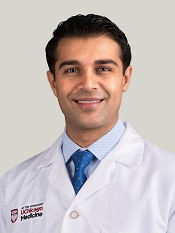Rohan Kalathiya, MD
The hands-on procedural aspects as well as the cognitive challenges of interventional cardiology are what attracted this fellow to the field.

Rohan Kalathiya, MD, is completing a 1-year interventional cardiology fellowship at the University of Chicago, Illinois, where he also completed his cardiology training and served as the chief fellow. Kalathiya attended the University of Kentucky College of Medicine (Lexington, KY), graduating summa cum laude with Alpha Omega Alpha (AOA) distinction. He subsequently completed his internal medicine residency through the Osler Medical Training Program at the Johns Hopkins Hospital (Baltimore, MD). He has co-authored and presented research on a variety of topics and is currently a lead co-investigator for the CHILL-SHOCK trial, which is evaluating the role of therapeutic hypothermia in cardiogenic shock. Kalathiya is currently looking for a position that will allow him to perform complex coronary as well as structural interventions in a clinical setting where he will also have the opportunity to participate in clinical research.
Tell us about yourself and how you’ve gotten to this point in your career.
I was born in India, grew up in Lexington, KY, and later went to the University of Kentucky, where I majored in chemical engineering. I met my wife while visiting Georgetown School of Medicine on an ‘away’ rotation as a fourth-year medical student. She finished her internal medicine training at Georgetown while I was at Johns Hopkins in Baltimore. We got married at the end of residency and subsequently couples-matched for fellowships to the University of Chicago—her for gastroenterology and me for cardiology. I feel fortunate to be in a program that combines both structural and coronary training during the 1-year interventional cardiology fellowship: I'm getting a great amount of case experience, which has been exciting as I continue to hone my interventional skills.
Why did you decide to pursue a career in interventional cardiology?
As a general cardiology fellow, I appreciated the procedural aspect of interventional cardiology in addition to the cognitive challenges it poses. The ability to treat a severe coronary lesion or a stenotic valve and effectively improve a patient’s symptoms is exciting and gratifying. Following these patients longitudinally and witnessing their recovery continues to motivate me.
Looking back, what has been your most meaningful clinical experience thus far?
One of the first STEMI cases I did as an interventional cardiology fellow was an unfortunate young nonsmoker in his 30s who presented with an anterior myocardial infarction. He was quite sick on presentation and we intervened on an occluded proximal left anterior descending artery. He had a complicated course in the coronary care unit, including severely depressed left ventricular function with left ventricular thrombus formation. He was discharged home and I feel fortunate to care for him in the outpatient setting. Watching his remarkable recovery—he has managed to return to the gym, with no physical limitations, and has gone travelling with his wife—remains one of my most meaningful experiences thus far.
What do you think is the biggest challenge facing interventional cardiology fellows today?
I think interventional cardiology positions are becoming more ‘niched’ as the breadth and complexity of the field continues to increase. Identifying your specific interests during fellowship can be challenging and requires introspection and good mentorship.
What is the best piece of advice a mentor has given you?
The best piece of advice I received was from a cardiologist during bedside rounds in residency. He always emphasized the importance of listening to your patients, since they often lead you to the right answer. I have found this to be true and feel it is even more important nowadays as we spend more time documenting and less time at the patient’s bedside.
What do you like to do in your free time?
My wife and I enjoy traveling and have visited several countries during the past few years. At home, we take full advantage of Chicago’s vibrant culinary scene and I enjoy watching college sports and playing basketball in my free time.
What his nominator Sandeep Nathan, MD, MSc (University of Chicago, IL), says:
To speak to and work with Dr. Kalathiya, you would never know that he is a first-generation American physician who came to the United States later in his youth than many of his contemporaries. I say this as a compliment, and from the perspective of a fellow first-generation immigrant physician. He has absorbed and embraced the very best of academic medicine in the United States and has served as a role model for many up-and-coming cardiovascular trainees at our own center and elsewhere. He arrived at a career in interventional cardiology after careful consideration of many career options within cardiovascular medicine, which makes him distinctly different from many other trainees who may be described as "interventional zealots" (myself included). His level-headed and analytic approach to his career choice as well as to clinical and nonclinical problems represents a mature process of deliberation, which all who work with him recognize as one of Rohan's signatures. He is excellent in the lab and confident in his skills, but very importantly also cognizant of what he has not yet mastered. Finally, on a personal note, Dr. Kalathiya is a consummate gentleman, a scholar, and the type of trainee of which every program director wishes he or she had more.
*To nominate a stellar cardiology fellow for the Featured Fellow section of TCTMD’s Fellows Forum, click here.
Yael L. Maxwell is Senior Medical Journalist for TCTMD and Section Editor of TCTMD's Fellows Forum. She served as the inaugural…
Read Full Bio

Comments